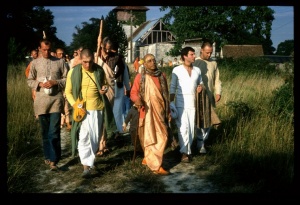CC Adi 13.100 (1975): Difference between revisions
(Vanibot #0027: CCMirror - Mirror CC's 1996 edition to form a basis for 1975) |
(Vanibot #0020: VersionCompareLinker - added a link to the Version Compare feature) |
||
| Line 2: | Line 2: | ||
<div style="float:left">'''[[Sri Caitanya-caritamrta (1975)|Śrī Caitanya-caritāmṛta (1975)]] - [[CC Adi (1975)|Ādi-līlā]] - [[CC Adi 13 (1975)|Chapter 13: The Advent of Lord Śrī Caitanya Mahāprabhu]]'''</div> | <div style="float:left">'''[[Sri Caitanya-caritamrta (1975)|Śrī Caitanya-caritāmṛta (1975)]] - [[CC Adi (1975)|Ādi-līlā]] - [[CC Adi 13 (1975)|Chapter 13: The Advent of Lord Śrī Caitanya Mahāprabhu]]'''</div> | ||
<div style="float:right">[[File:Go-previous.png|link=CC Adi 13.99 (1975)|Ādi-līlā 13.99]] '''[[CC Adi 13.99 (1975)|Ādi-līlā 13.99]] - [[CC Adi 13.101 (1975)|Ādi-līlā 13.101]]''' [[File:Go-next.png|link=CC Adi 13.101 (1975)|Ādi-līlā 13.101]]</div> | <div style="float:right">[[File:Go-previous.png|link=CC Adi 13.99 (1975)|Ādi-līlā 13.99]] '''[[CC Adi 13.99 (1975)|Ādi-līlā 13.99]] - [[CC Adi 13.101 (1975)|Ādi-līlā 13.101]]''' [[File:Go-next.png|link=CC Adi 13.101 (1975)|Ādi-līlā 13.101]]</div> | ||
{{CompareVersions|CC|Adi 13.100|CC 1975|CC 1996}} | |||
{{RandomImage}} | {{RandomImage}} | ||
==== TEXT 100 ==== | ==== TEXT 100 ==== | ||
<div class="verse"> | <div class="verse"> | ||
: | :dekhi' uparāga hāsi', śīghra gaṅgā-ghāṭe āsi' | ||
:ānande karila gaṅgā-snāna | :ānande karila gaṅgā-snāna | ||
:pāñā uparāga-chale, āpanāra mano-bale, | :pāñā uparāga-chale, āpanāra mano-bale, | ||
| Line 20: | Line 19: | ||
<div class="synonyms"> | <div class="synonyms"> | ||
dekhi'-seeing; uparāga—the eclipse; hāsi'-laughing; śīghra—very soon; gaṅga-ghāṭe—on the bank of the Ganges; āsi'-coming; ānande—in jubilation; karila—took; gaṅgā-snāna—bath in the Ganges; pāñā—taking advantage of; uparāga-chale—on the event of the lunar eclipse; āpanāra—His own; manaḥ-bale—by the strength of mind; brāhmaṇere—unto the brāhmaṇas; dila—gave; nānā—various; dāna—charities. | |||
</div> | </div> | ||
| Line 27: | Line 26: | ||
<div class="translation"> | <div class="translation"> | ||
Seeing the lunar eclipse and laughing, Advaita Ācārya and Haridāsa Ṭhākura immediately went to the bank of the Ganges and bathed in the | Seeing the lunar eclipse and laughing, both Advaita Ācārya and Haridāsa Ṭhākura immediately went to the bank of the Ganges and bathed in the Ganges in great jubilation. Taking advantage of the occasion of the lunar eclipse, Advaita Ācārya, by His own mental strength, distributed various types of charity to the brāhmaṇas. | ||
</div> | </div> | ||
| Line 34: | Line 33: | ||
<div class="purport"> | <div class="purport"> | ||
It is the custom of Hindus to give in charity to the poor as much as possible during the time of a lunar or solar eclipse. Advaita Ācārya, therefore, taking advantage of this eclipse, distributed many varieties of charity to the brāhmaṇas. In Śrīmad-Bhāgavatam | It is the custom of Hindus to give in charity to the poor as much as possible during the time of a lunar or solar eclipse. Advaita Ācārya, therefore, taking advantage of this eclipse, distributed many varieties of charity to the brāhmaṇas. In the Śrīmad-Bhāgavatam there is a statement in the Tenth Canto, Third Chapter, verse 11, that when Kṛṣṇa took His birth, immediately Vasudeva, taking advantage of this moment, distributed ten thousand cows to the brāhmaṇas. It is customary among Hindus that at the time a child is born, especially a male child, the parents distribute great charity in jubilation. Advaita Ācārya was actually interested in distributing charity because of Lord Caitanya's birth at the time of the lunar eclipse. People could not understand, however, why Advaita Ācārya was giving such a great variety of things in charity. He did so not because of the lunar eclipse but because of the Lord's taking birth at that moment. He distributed charity exactly as Vasudeva did at the time of Lord Kṛṣṇa's appearance. | ||
</div> | </div> | ||
Latest revision as of 14:54, 26 January 2020

A.C. Bhaktivedanta Swami Prabhupada
TEXT 100
- dekhi' uparāga hāsi', śīghra gaṅgā-ghāṭe āsi'
- ānande karila gaṅgā-snāna
- pāñā uparāga-chale, āpanāra mano-bale,
- brāhmaṇere dila nānā dāna
SYNONYMS
dekhi'-seeing; uparāga—the eclipse; hāsi'-laughing; śīghra—very soon; gaṅga-ghāṭe—on the bank of the Ganges; āsi'-coming; ānande—in jubilation; karila—took; gaṅgā-snāna—bath in the Ganges; pāñā—taking advantage of; uparāga-chale—on the event of the lunar eclipse; āpanāra—His own; manaḥ-bale—by the strength of mind; brāhmaṇere—unto the brāhmaṇas; dila—gave; nānā—various; dāna—charities.
TRANSLATION
Seeing the lunar eclipse and laughing, both Advaita Ācārya and Haridāsa Ṭhākura immediately went to the bank of the Ganges and bathed in the Ganges in great jubilation. Taking advantage of the occasion of the lunar eclipse, Advaita Ācārya, by His own mental strength, distributed various types of charity to the brāhmaṇas.
PURPORT
It is the custom of Hindus to give in charity to the poor as much as possible during the time of a lunar or solar eclipse. Advaita Ācārya, therefore, taking advantage of this eclipse, distributed many varieties of charity to the brāhmaṇas. In the Śrīmad-Bhāgavatam there is a statement in the Tenth Canto, Third Chapter, verse 11, that when Kṛṣṇa took His birth, immediately Vasudeva, taking advantage of this moment, distributed ten thousand cows to the brāhmaṇas. It is customary among Hindus that at the time a child is born, especially a male child, the parents distribute great charity in jubilation. Advaita Ācārya was actually interested in distributing charity because of Lord Caitanya's birth at the time of the lunar eclipse. People could not understand, however, why Advaita Ācārya was giving such a great variety of things in charity. He did so not because of the lunar eclipse but because of the Lord's taking birth at that moment. He distributed charity exactly as Vasudeva did at the time of Lord Kṛṣṇa's appearance.